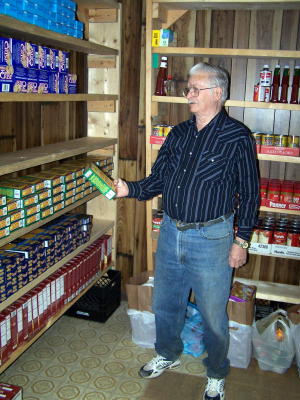THE CHANGING FACE OF POVERTY - Calhoun's Food Pantry's Helping Hand, You Can Help This Holiday Season

Trippett says "I've never tired of doing this work,"
referring to operating the county's Community Food Pantry
By Bob Weaver
As the USA's economic crisis worsens, more and more people are coming to food pantries for help, and many of them are struggling with requests rising and donations lagging.
Unlike past recessions, rural areas of West Virginia will not be spared, with the faces of those affected by hunger changing.
Before it gets worse, there is a wrenching statistic, according to WV Kids Count - one third of Calhoun's kids are living in poverty, with the county ranked 41st in the state, seven other counties have it worse, including Kanawha.
About 80% of Calhoun's school children are eligible for free or reduced lunch.
Calhoun's Community Food Pantry operated from the First Baptist Church in Grantsville has been a mainstay against hunger for over 16 years.
The pantry's long-time manager, Pete Trippett, said "Requests started increasing about two years ago, but now they are speeding up."
At least 25 county churches and 25 other county groups donate cash and food to the pantry, Trippett said, indicating "The entire operation depends on community support."
"People in Calhoun don't want to ask for help," he said, "Too much pride, but new people are starting to come. They're up against the wall."
During the past year, the local pantry filled 2,508 requests.
"We don't put a bunch of strings or requirements on who gets the food," Trippett said, who has been issuing items since 1992.
"We trust that people will not abuse the help the community is providing," he said.
The pantry is always in need of donations of cash and food, since it is self-supporting by the generosity of Calhoun citizens.
Supporters of the pantry are asking readers to consider a Christmas gift to the bank, maybe in lieu of consumer items.
Checks can be made to First Baptist Church with the memo denoting FOOD PANTRY, and mailed to First Baptist Church, PO Box 237, Grantsville WV 26147.
Questions, donations of food, or requests for food, call Pete Trippett at 304-354-7966.
More West Virginians are receiving food stamps than ever before, according to new data from the federal government and the State Department of Health and Human Resources.
Rich Westfall, Community Services Manager for DHHR in Grantsville, said last week that requests for food stamps are increasing locally.
About 281,400 people in WV received food stamp benefits in September, the latest month for which data is available, a four-percent increase.
About one in 10 Americans is now receiving federal food stamp benefits, an all-time high that's likely to increase as the economy worsens and more people are out of work.
The nation's food stamp program was renamed in October to Supplemental Nutrition Assistance Program (SNAP).
The current recession will worsen in 2009, according to economic indicators.
West Virginia has not fared well in poverty figures during good times, state households receiving benefits have steadily increased, said Randal Thomas, a program manager at DHHR.
Anti-hunger advocates say unemployment and other economic troubles are why many are struggling to feed themselves and their kids.
Nationwide, 31.5 million Americans now receive food stamps - a 17 percent increase from last fall.
Food banks nationwide are seeing a 20 percent increase in clients.
Over 80 percent of the banks have indicated they are currently unable to adequately meet the increased demand without having to reduce the amount of food they distribute.
Feeding America, formerly called Second Harvest, has been urging Congress to provide additional funding to help food banks throughout the nation meet the growing demand for emergency food assistance.
High food prices, energy costs and utility bills are having a devastating effect on the working poor, the recently unemployed and many low-income Americans, who struggle to put food on the family table.
"As the economic crisis worsens, more and more people are coming to food pantries and soup kitchens served by our network of food banks, desperately seeking help to feed themselves and their families," said Vicki Escarra, president and CEO of Feeding America.
"We are seeing new faces asking for help, including people who were once financial supporters of our food banks," she said.
Feeding America says that more than 36 million Americans face the prospects of hunger each day.
A survey of Feeding America Food Banks in May 2008 reported average increases of 15-20% in the number of people seeking emergency food assistance compared to a year prior.
More recent economic conditions are forcing even more people to seek help from local feeding organizations.
As the economy falters and food prices seemingly rise as fast as the unemployment rolls, the face of hunger is evolving, says Jennifer McLean, vice president of operations of New York's City Harvest.
Read RECESSION BOUND: One-Third Calhoun Kids In Poverty